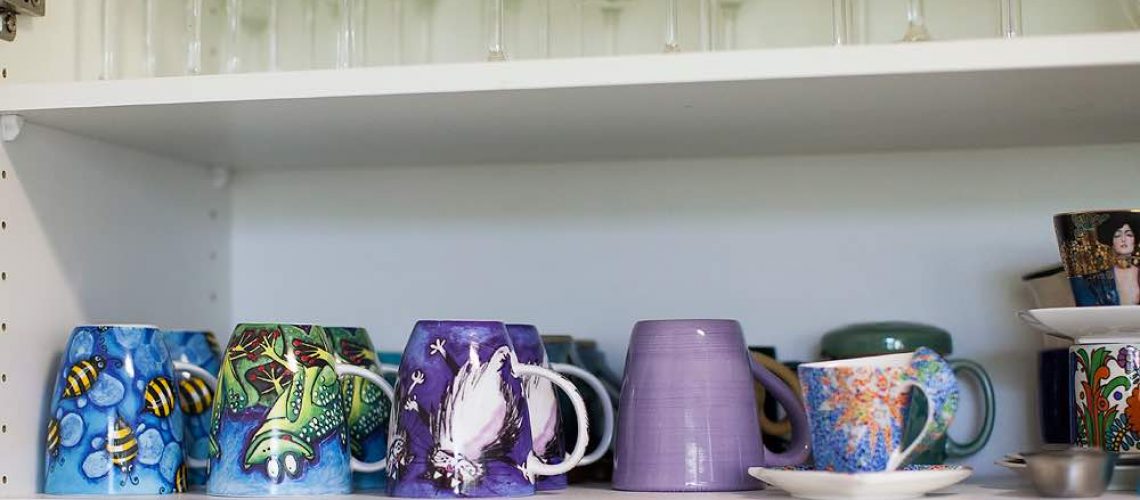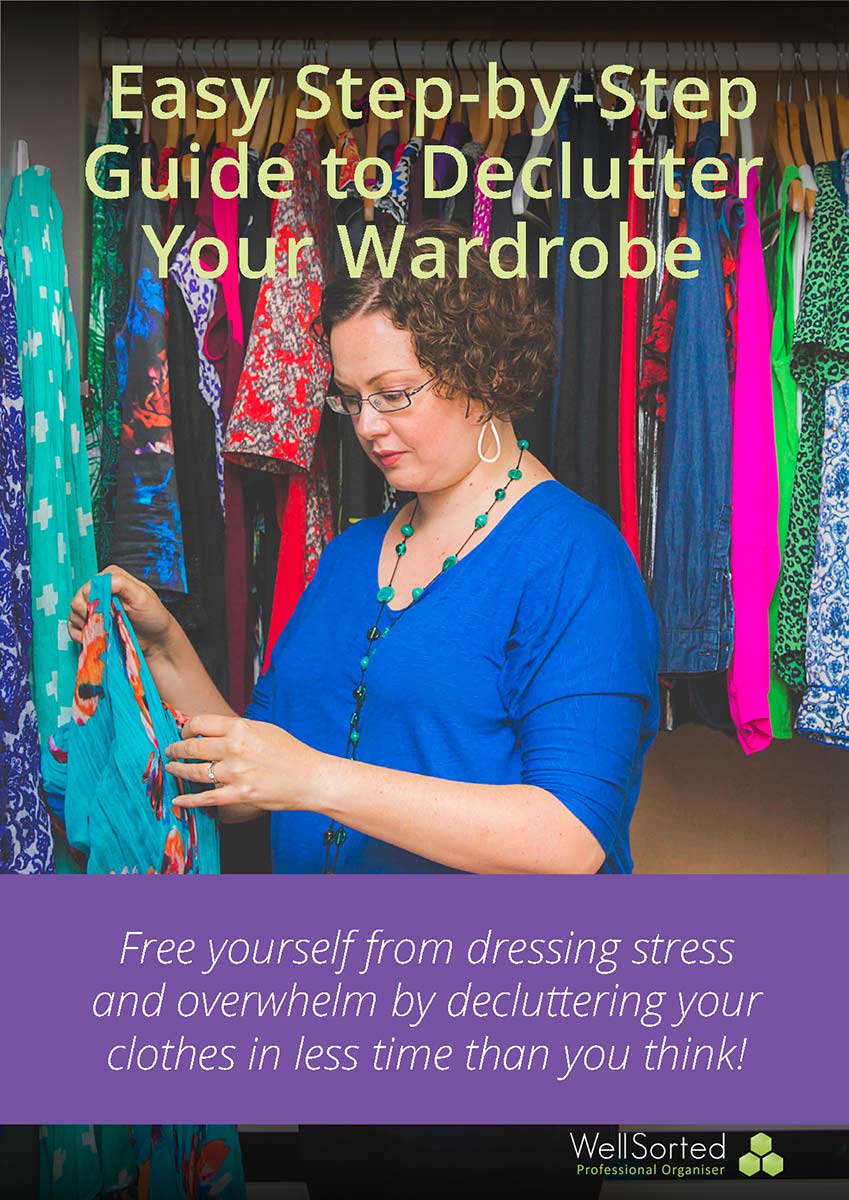Are you keeping things ‘just in case’? It is a common excuse I hear in my consultations with clients. “Just in case it comes in handy…” “Just in case I need it again….” “Just in case… you know… well my mum and dad used to keep things like this and we always had what we needed to finish a project”.
You know the things I’m talking about. It’s:
- The melon baller in your kitchen drawer that you have never used… what if you ever wanted to make that Melon Ball Cocktail you saw in a magazine once?
- Or that piece of metal in the laundry cupboard, that you used once to fish something out of the lint filter of the washing machine… what if you needed to do that again?
- Or maybe even those pants you bought to wear on your last long haul flight. You never wear them any other time, just when flying… but what if you travel again?
There are many examples of these ‘just in case’ items in homes across the globe. We all have different reasons for our ‘just in case’ stuff.
So how do we get around this common reason to keep something?
Well, firstly we want to consider what our goal is. If you understand your vision for your home, and you hold that in mind, you’ll be clearer knowing if this ‘just in case’ item deserves space in your house. These items are, essentially, clutter – up until the moment you decide to use them because, for the rest of its life, you’ve assessed it as something you don’t need or use now… but maybe you will. Or you use it so infrequently that you know it’s taking up valuable space….
So, to help you consciously decide if these items do deserve a place in your home, as something you will use….or if they are no longer needed or valued why not ask yourself the following questions?
Questions to ask about ‘just in case’ things:
Would you remember where to find it, if you ever needed it again?
If the answer is no, let it go. I want you to be really honest with yourself here! It’s easy to say, “Oh yes, right now I will put it here… and I’ll remember it’s here.” But really, be realistic. Will you actually remember that random doodad is on the third shelf in the pantry for the miraculous day it perfectly fixes a project you’ve been meaning to complete? Really? Chances are, if you didn’t remember you had it before laying your eyes on it at this particular moment, you are unlikely to remember you have it when you do finally find a chance to use it. So let it go.
If you can hand-on-heart, say you could find it again – make sure it goes into a proper home. Make up a ‘useful doodads box’ if you must. Don’t just leave it where you found it. Consciously make a choice to keep it, decide on the why and get it into a proper home.
Are you resourceful?
Let’s go back to the piece of metal you’ve kept to fish things out of your lint filter. (Note, I’m not advocating shoving things into electronics. Safety first people!). Let’s imagine that you threw it out. Dang, there’s lint stuck in the lint filter that you can’t reach, if only you hadn’t thrown out that bit of metal…
(Cue disaster music)
These things will happen. So, is there anything else you could use instead? Could you bend a paperclip and use that? Are you resourceful? Can you get creative and come up with another solution? Could you source another piece of metal elsewhere (like your Buy Nothing Group)? Reminding yourself that you’re faced with these sorts of decisions regularly, and you are able to come up with solutions can be powerful. Sure, it would have been great to have that bit you were keeping ‘just in case’ but you could have also gone your entire lifetime never needing that piece of metal again.
Do you have something similar that could do the job?
This question is similar to some of the ones above, but it is slightly different. For instance, appliances in the kitchen are a great example of this. Do you really need a stick blender and a normal blender? If you only used the stick blender for that soup you made three Christmases ago… would the other blender do? “But the stick blender blends the soup better”. Well sure, but could you live with a sub-par blend for one dish a year in return for what space you create in the cupboard by letting it go? (psst… don’t be fooled by the voice in your head that says, “But it’s not taking up that much room”).
What are you saying ‘Yes’ to by letting it go?
What space would you create if you let go of all the ‘just in case’ stuff? When you consider a tiny doodad, you might argue ‘not much’… but when you add it all together, you’d be surprised by how much space you create. How much clarity do you get opening the cupboard to items you use regularly, and those items surrounded in space? When you say yes to letting it go, you’re also saying yes to space for something else you’ve been trying to find a home for. You’re saying ‘yes’ to space to see what you do have… and you’re saying ‘yes’ to space to do an activity you’ve always wanted to do. You’re also saying ‘yes’ to maintaining your sanity, as you will be saving yourself time looking for stuff.
What’s the worst-case scenario?
Time and time again, I’ve heard a client say, “Oh but last time I tossed something like this, I then found I needed it two weeks later, and regretted throwing that out!”
Worrying that we will make the wrong decision is a big reason for keeping things ‘just in case’. Sometimes we will toss something we need again. When that happens we can reduce our confidence in making decisions like this again in the future. So, when choosing to let it go, go ahead – consider the worst-case scenario. What could happen? Go on imagine it.
Now think through what you would do if that happened. Could you find it elsewhere or use something else? Can it be repurchased or borrowed from a neighbour? Would you survive? Would you live? If so, let it go.
(Please note: When it comes to the feelings that arise in the moment you realise you could have used the thing you gave away, it’s good to be prepared for them. You may feel like you made the wrong decision,or you could have saved yourself $10 because now you have to buy it again. You may have feelings of not being good enough or of guilt. Don’t let those feelings win out. Remind yourself that you decided to let it go because you value your space and your sanity more at that moment. Remember that you decided that the ‘worst-case scenario’ wouldn’t kill you and you made the right choice. Be kind to yourself is essentially what I’m asking you to do here).
Sometimes it is okay to keep things ‘just in case’
These questions should help you release a lot of ‘just in case’ things… or at least help you decide, consciously, that you want to keep it.
On occasion, when deciding if these ‘just in case’ things are worth keeping, you will say yes. You might decide that you want to keep those comfy pants for a long-haul flight. When you do decide to keep them, just make sure you store them where they belong. Put those travel pants in your travel/suitcase spot. It’s out of the way of your everyday wear and it’s in a spot you’re likely to find them when it’s time for your next long flight.
So, what are you keeping ‘just in case’? Jump onto the WellSorted Facebook Group and let us know!







